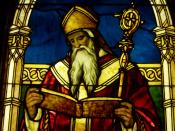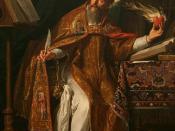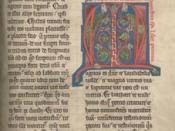In the late 300's AD, a famous, well-educated "heretic" named Augustine came to the city of Milan. A former teacher, Augustine was known as a dazzling rhetorician, and became an orator for the city, gradually moving up the imperial hierarchy. In this passage from his Confessions, Saint Augustine turns the literary artistry of his oratorical talents to the task of describing his disillusionment with Manicheism in the form of a prayer addressed directly to the Heavenly Father. His literary artistry is shown in his use of extended apostrophe and imagery to communicate his humbled submissiveness to God.
Augustine was born in 354 AD in the North African city of Thagaste. His father, Patrick, was a pagan, and his mother, Monica, was a devout Christian who labored untiringly for her son's conversion to Christianity. Augustine received his grammar-level education in Thagaste, and, with the blessing of the wealthy patron Romanianus, went on to study rhetoric in Carthage.
It was in Carthage that Augustine took up the doctrine of Manicheism, a theological philosophy that claimed that all matter and darkness were evil, and all light and nonmatter were good. After spending years as a teacher in Carthage and Rome, in 384 Augustine traveled to Milan to become an orator for the city. It was in Milan that Augustine met Ambrose, the city's bishop, who welcomed Augustine like a father, and introduced him to the works of the theologian Origen. Augustine maintained his Manichean beliefs for the time being, and critiqued Ambrose's sermons with contempt for their subject, but with the objectivity that one craftsman uses in appraising the work of another, regardless of content. In this passage, which accounts for events occurring sometime between 384 and 386 AD, Augustine speaks of his wish to have further discussions with Ambrose, Bishop of...



It was ok
this was an ok analysis. it could have gotten more into depth but it did cover the basiscs. overal i throughly enjoyed it please keep writing and posting
0 out of 0 people found this comment useful.